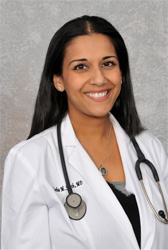By: SNEHA SHETH, M.D.
When you hear the term ADHD (Attention Deficit Hyperactivity Disorder), do you imagine a noisy child bouncing from room to room, making a mess as they go?
ADHD is often diagnosed in childhood, but about 4% of adults also deal with it. Among adults, Millennials have the highest rate of ADHD, and that is growing. From 2014 to 2018, for example, the number of Millennials diagnosed with ADHD rose by a whopping 39%.
It’s in your head
ADHD is a common neurological (brain) disorder with symptoms that include impulsiveness/lack of self-control, restlessness/hyperactivity and difficulty paying attention. If you have the condition as an adult, it may be hard for you to focus and prioritize, leading to missed deadlines and forgotten meetings or social plans. The inability to control impulses can range from impatience waiting in line or driving in traffic to mood swings and outbursts of anger.
Nailing down a diagnosis
To find out if you have ADHD, your doctor may do a series of tests, including psychological screening and ADHD rating scale. The condition typically falls into one of three categories:
- Impulsive-hyperactive —The least common form of ADHD, it makes you impulsive and restless.
- Inattentive and distractible — This type reduces your ability to pay attention.
- Combined — This is the most common kind and includes symptoms from the other two forms.
Treating ADHD
Without treatment, ADHD can get you into trouble. It may lead to money issues, cause problems with the law, and make it hard for you to keep a job. It can increase your risk for substance or alcohol abuse, car accidents, and relationship troubles.
ADHD can’t be cured but it can be managed with education, support and treatment. Your MPCP healthcare provider can offer resources to help you learn about your condition, such as the organization Children and Adults with Attention-Deficit/Hyperactivity Disorder. Your provider may recommend taking medicine to control your symptoms. You may also benefit from counseling or therapy to help you get organized, improve relationships and manage your time.
Hacks for living with ADHD
In addition to treatment, many adults with ADHD use strategies to help them stay organized and focused. Here are some tips from a woman with ADHD:
- Make a list: Use written reminders and lists to keep track of your day. This may include grocery lists, event planning, and to-do checklists.
- Use visual reminders: Post notes around your house or office to remind you of what you need to do and when. They will jog your memory and help you stay on track.
- Keep it clean: An organized, uncluttered house or workspace reduces distractions and helps you focus on the task at hand.
- Be accountable: Ask friends and family to remind you about things you need to do, such as appointments, work deadlines, paying bills and personal commitments. This will make you less likely to forget and miss something important.
 Dr. Sheth sees patients at MPCP’s Arundel Mills office. She earned her medical degree at St. George`s University School of Medicine and is certified by the American Board of Family Medicine.
Dr. Sheth sees patients at MPCP’s Arundel Mills office. She earned her medical degree at St. George`s University School of Medicine and is certified by the American Board of Family Medicine.



